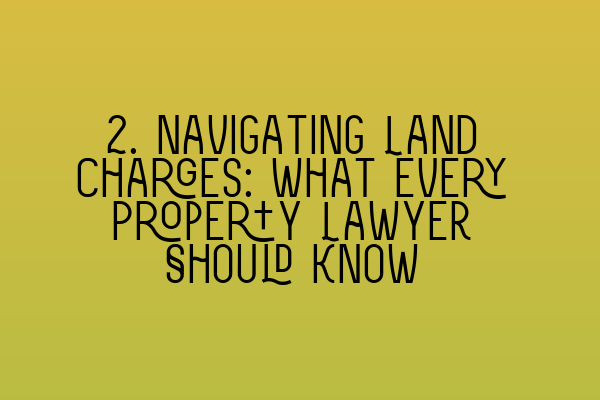Navigating Land Charges: What Every Property Lawyer Should Know
As a property lawyer, it is essential to have a comprehensive understanding of land charges and how they can impact your clients’ property transactions. Land charges are an important aspect of property law that can greatly influence the ownership and use of land. In this article, we will take an in-depth look at land charges and provide you with the knowledge you need to navigate them with confidence.
What are Land Charges?
Land charges refer to interests or rights that are registered against the title to a property. These charges act as a form of protection for individuals or organizations with a legal interest in a property. They are recorded in the Land Charges Register, which is a central repository for all land charge registrations in England and Wales.
Understanding the Different Types of Land Charges
There are several types of land charges that property lawyers need to be familiar with. Let’s explore some of the most common ones:
1. Class F Land Charges:
Class F land charges include various interests related to land, such as restrictive covenants, equitable charges, and other equitable rights. These charges can significantly impact the use and development of a property.
2. Matrimonial Home Rights:
Matrimonial home rights are rights acquired by a spouse or civil partner to occupy a property that is or was their matrimonial home. These rights are registered to protect the interests of the non-owning spouse.
3. Interests under the Insolvency Act 1986:
This category includes interests in property arising from insolvency proceedings, such as bankruptcy and voluntary arrangements. These interests are registered to protect the rights of creditors.
4. Local Land Charges:
Local land charges refer to charges or restrictions imposed by local authorities. These charges can include planning restrictions, conservation areas, tree preservation orders, and listed buildings. It is crucial to investigate local land charges thoroughly to ensure compliance with local regulations.
Navigating Land Charges Efficiently
As a property lawyer, it is important to have efficient processes in place when dealing with land charges. Here are some tips to help you navigate this area of property law effectively:
1. Conduct Comprehensive Searches:
When acting for clients in property transactions, it is crucial to perform comprehensive searches to identify any registered land charges. This includes Land Charges Registry searches, local authority searches, and environmental searches. Thorough searches will ensure that all relevant charges and restrictions are discovered.
2. Reviewing Search Results:
After conducting the necessary searches, it is essential to review the search results carefully. Analyze the information obtained and assess the implications of any land charges on your clients’ property transactions. This will enable you to provide accurate advice and guidance to your clients.
3. Communicate with Clients:
Clear communication with your clients is vital throughout the entire process. Explain the implications of any land charges discovered during the searches and discuss the options available to address them. Keeping your clients informed and involved will help build trust and ensure they are well-informed about the potential challenges they may face.
4. Engage with Experts:
Sometimes, the complexities of land charges require the assistance of experts. If you come across particularly challenging or unusual land charges, consider engaging with property law specialists who have expertise in dealing with such matters. Their knowledge and experience can prove invaluable in resolving complex issues and ensuring a smooth property transaction.
Stay Updated and Informed
Property law, including land charges, is subject to constant updates and changes. As a property lawyer, it is essential to stay updated on any legal developments or guidelines related to land charges. Attend relevant continuing professional development (CPD) events and consider enrolling in specialized courses to enhance your knowledge and skills in this area.
Conclusion
Navigating land charges can be a complex process, but with the right knowledge and procedures in place, property lawyers can effectively handle these challenges. By conducting comprehensive searches, reviewing search results carefully, communicating with clients, and engaging with experts when necessary, you can ensure a successful property transaction for your clients.
If you want to test your knowledge and preparation for the SQE exams, check out our Related Articles:
– SQE 1 Practice Exam Questions
– SQE 1 Practice Mocks FLK1 FLK2
For comprehensive preparation courses for SQE 1 and SQE 2, visit our website:
– SQE 2 Preparation Courses
– SQE 1 Preparation Courses
Stay informed about SRA SQE exam dates by visiting:
– SRA SQE Exam Dates
At SQE Property Law & Land Law, we are committed to providing you with the best resources and information to excel in your property law career.
